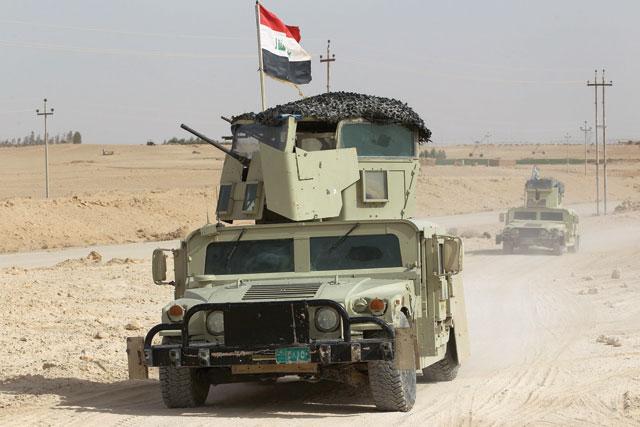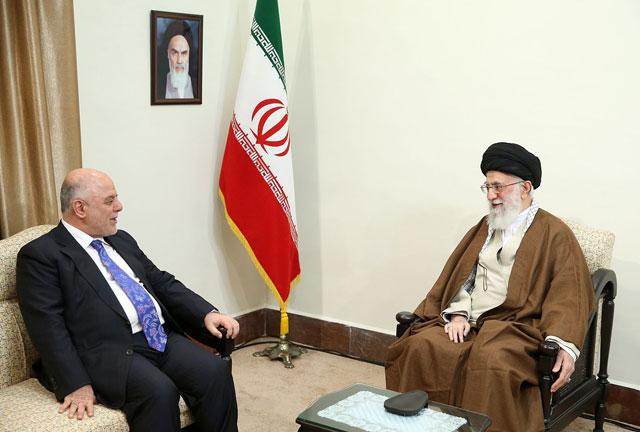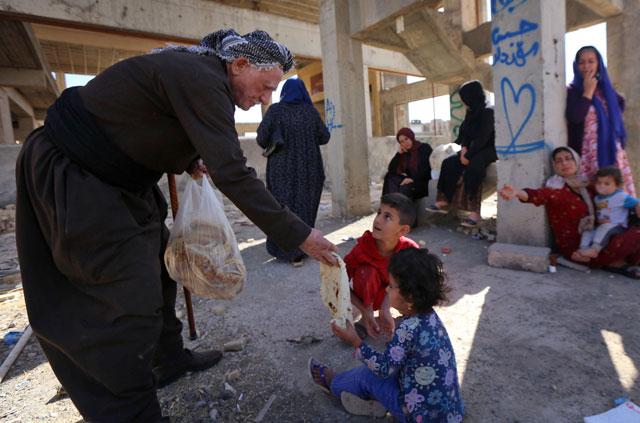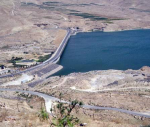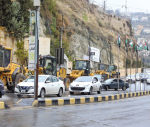You are here
Kurds offer to suspend independence drive, seek talks with Baghdad
By Reuters - Oct 25,2017 - Last updated at Oct 25,2017
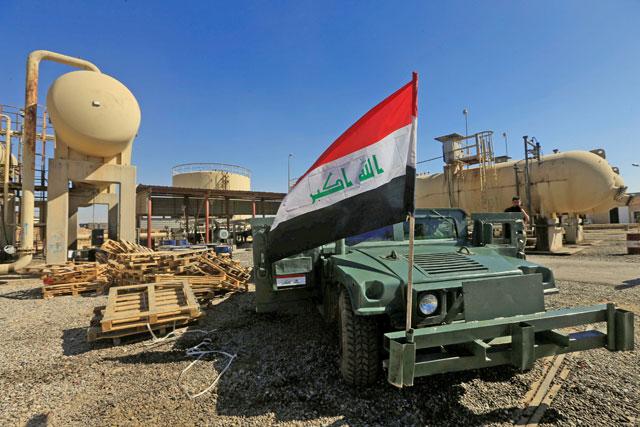
An Iraqi flag is seen on a military vehicle at an oilfield in Dibis area on the outskirts of Kirkuk, Iraq, October 17 (Reuters photo)
BAGHDAD — Kurdish authorities in Iraq offered on Wednesday to put an independence drive on hold, stepping up efforts to resolve a crisis in relations with Baghdad via dialogue.
But an Iraqi military spokesman suggested an offensive — launched to wrest back territory after Kurds voted overwhelmingly for independence in a referendum in September — would continue regardless.
The Iraqi government has transformed the balance of power in the north of the country since launching its campaign last week against the Kurds, who govern an autonomous region of three northern provinces.
"The fighting between the two sides will not produce a victory for any, it will take the country to total destruction," the Kurdistan Regional Government (KRG) said in a statement.
The KRG proposed an immediate ceasefire, a suspension of the referendum result and "starting an open dialogue with the federal government based on the Iraqi Constitution".
Baghdad declared the referendum illegal and responded by seizing back the city of Kirkuk, the oil-producing areas around it and other territory that the Kurds had captured from Daesh militant group.
In a brief social media comment hinting that the campaign would continue, an Iraqi military spokesman said: "Military operations are not connected to politics."
Prime Minister Haider Al Abadi has said the KRG should cancel the vote's outcome as a pre-condition for talks and several Shiite members of parliament on Wednesday asked him to stick to his position and not to accept just a freeze of the referendum.
On Wednesday, Abadi began an official visit to neighbouring Turkey and Iran during which relations with the Kurds — whose communities are established in parts of all three countries as well as Syria — will be high on the agenda.
Iran announced the reopening of one of the border crossings with the Kurdistan region of Iraq, closed earlier this month in support of the Iraqi government.
In Ankara, President Tayyip Erdogan said Turkey was ready to give all support to Baghdad as it seeks to reopen a crude oil pipeline from the Kirkuk oilfields to Turkey, through which Iraq stopped sending oil in 2014.
In a statement to media after meeting Abadi, Erdogan said they discussed what political, military and economic steps they could take after what he called the “illegitimate” Iraqi Kurdish referendum last month.
Strategically vital
Abadi has ordered his army to recapture all disputed territory and has demanded central control of Iraq’s border crossings with Turkey, all of which are inside the Kurdish autonomous region.
Kurdish Peshmerga forces beat back an advance by Iranian-backed pro-government paramilitaries on Tuesday in the region of Rabi’a, 40 km (25 miles) south of the Fish-Khabur border area with Turkey and Syria, Kurdish officials said.
Fish-Khabur is strategically vital because oil from both Kurdish and government-held parts of northern Iraq crosses via a pipeline there into Turkey, the main route out of the area for the exports that are crucial to any Kurdish independence bid.
The fighting so far has taken place outside the Kurdish autonomous region, but Fish-Khabur is inside it.
The fighting between the central government and the Kurds is particularly tricky for the United States which is a close ally of both sides, arming and training both the Kurds and the central government’s army to fight the Daesh terror group.
The Iraqi government’s advance over the past week has been achieved with comparatively little violence, with Kurds mostly withdrawing without a fight.
But it caused Kurds to flee en masse from Tuz Khurmato, a multi-ethnic city south of Kirkuk where sectarian tension flared after Iraqi forces took control, humanitarian organisations said.
Most of those displaced, estimated at nearly 30,000, are in need of urgent aid and staying in open shelters, officials from two international humanitarian organisations told Reuters.
Iraqi forces are preparing in parallel an offensive to recapture the last patch of Iraqi territory still in the hands of Islamic State, on the border with Syria, the military said on Wednesday.
The militant group also holds parts of the Syrian side of the border, but the area under their control is also shrinking there as they retreat in the face of two sets of hostile forces - a US-backed, Kurdish-led coalition and Syrian government troops with foreign sHIITE militias backed by Iran and Russia.
Related Articles
BAGHDAD — Iraq's Kurdish region said on Thursday it had offered a joint Kurdish-Iraqi deployment at a strategic crossing into Turkey with th
BAGHDAD — Iraq's prime minister demanded on Thursday that Kurds declare their independence referendum void, rejecting the Kurdish autonomous
ERBIL, Iraq/BAGHDAD — About 100,000 Kurds have fled the Kirkuk region for fear of persecution since Iraqi armed forces retook disputed terri


